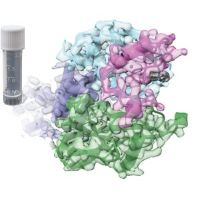Specification
| Organism | Homo sapiens (Human) |
| Expression Host | E.coli |
| Tag Info | N-terminal 10xHis-tagged and C-terminal Myc-tagged |
| Purity | Greater than 85% by SDS-PAGE |
| Uniprot ID | P29317 |
| Gene Names | EPHA2 |
| Alternative Names | Epithelial cell kinase Tyrosine-protein kinase receptor ECK ECK |
| Expression Region | Partial(28-328aa ) |
| Molecular Weight | 38.3 kDa |
| Protein Sequence | EVVLLDFAAAGGELGWLTHPYGKGWDLMQNIMNDMPIYMYSVCNVMSGDQDNWLRTNWVYRGEAERIFIELKFTVRDCNSFPGGASSCKETFNLYYAESDLDYGTNFQKRLFTKIDTIAPDEITVSSDFEARHVKLNVEERSVGPLTRKGFYLAFQDIGACVALLSVRVYYKKCPELLQGLAHFPETIAGSDAPSLATVAGTCVDHAVVPPGGEEPRMHCAVDGEWLVPIGQCLCQAGYEKVEDACQACSPGFFKFEASESPCLECPEHTLPSPEGATSCECEEGFFRAPQDPASMPCTRP |
| Form | Liquid or Lyophilization |
| Buffer | The default storage buffer is Tris/PBS-based buffer, 5%-50% glycerol if the delivery form is liquid. The lyophilization buffer is Tris/PBS-based buffer, 6% Trehalose, pH 8.0 if the delivery form is lyophilized powder. Please contact us if you have any special requirment. |
| Reconstitution | Please reconstitute protein in deionized sterile water and we recommend that briefly centrifuge thevial prior to opening the vial .We recommend aliquot for long-term storage at -20℃/-80℃. |
Background
| Relevance | Receptor tyrosine kinase which binds promiscuously membrane-bound ephrin-A family ligands residing on adjacent cells, leading to contact-dependent bidirectional signaling into neighboring cells. The signaling pathway downstream of the receptor is referred to as forward signaling while the signaling pathway downstream of the ephrin ligand is referred to as reverse signaling. Activated by the ligand ephrin-A1/EFNA1 regulates migration, integrin-mediated adhesion, proliferation and differentiation of cells. Regulates cell adhesion and differentiation through DSG1/desmoglein-1 and inhibition of the ERK1/ERK2 (MAPK3/MAPK1, respectively) signaling pathway. May also participate in UV radiation-induced apoptosis and have a ligand-independent stimulatory effect on chemotactic cell migration. During development, may function in distinctive aspects of pattern formation and subsequently in development of several fetal tissues. Involved for instance in angiogenesis, in early hindbrain development and epithelial proliferation and branching morphogenesis during mammary gland development. Engaged by the ligand ephrin-A5/EFNA5 may regulate lens fiber cells shape and interactions and be important for lens transparency development and maintenance. With ephrin-A2/EFNA2 may play a role in bone remodeling through regulation of osteoclastogenesis and osteoblastogenesis. |
| Involvement in Disease | Cataract 6, multiple types (CTRCT6) |
| Subcellular Location | Cell membrane, Single-pass type I membrane protein, Cell projection, ruffle membrane, Single-pass type I membrane protein, Cell projection, lamellipodium membrane, Single-pass type I membrane protein, Cell junction, focal adhesion |
| Protein Families | Protein kinase superfamily, Tyr protein kinase family, Ephrin receptor subfamily |
| Tissue Specificity | EPHA2 |
QC Data
| Note | Please contact us for QC Data |
| Product Image (Reference Only) |  |

